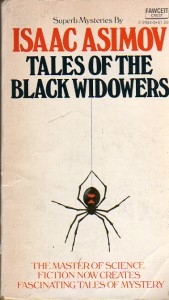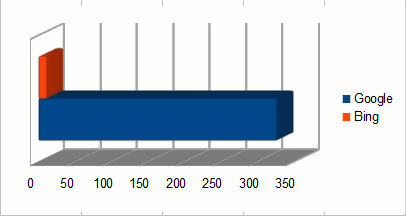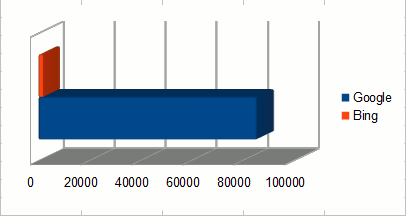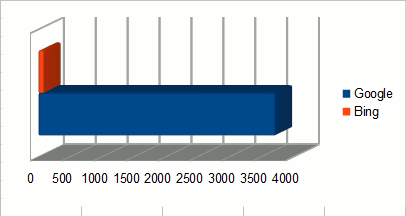In my previous post, Search engine hits: Google vs. Bing (part 1), I showed how three of my sites — a recent US-hosted blog in English, a popular Portugal-hosted forum in Portuguese, and a search engine-weak US-hosted aggregator in English — had a much greater proportion of search engine hits from Google than from Bing — about 100 Google hits for each 2-3 Bing hits. Naturally, the next step would be to investigate whether this is just a matter of quantity — in other words, Bing has 2-3% of the users Google has –, or whether there are other factors affecting this, such as the three sites having better rankings in Google than in Bing. This, then, is the subject of this post.
The method I’ll be using is the following: for each of the same three sites used in the last post, I’ll be searching for a number of phrases that I think should, reasonably, lead a user to the site. I won’t look at my stats to get the top phrases from there; as most hits come from Google, I’d just be using phrases that I already know work for that engine. And, for each phrase, I’ll note the position my site came in — it at all.
Remember that a lower number is better. Also, a caveat: I am not really testing how “good” each search engine is, only how good it is at sending people to my sites from appropriate queries. I have, however, avoided “gaming the system”; the queries are reasonable and not “custom-designed” to lead people to where I want, and the pages / sites are relevant to them.
Note: all queries were as written below; i.e. without quotes.
Results
Winterdrake:
For this very blog, I searched for things I know I posted about — but not the exact titles. Instead, I tried strings that I myself would use if searching for those subjects:
[table id=1 /]
DragonBall-PT:
For that MyBB forum with mostly Brazilian and Portuguese users, I didn’t go for particular posts, just some strings that a Portuguese-speaking person could possibly use, and I counted the first forum post that appeared. I tried to diversify; hence the “dragonball”, “dragon ball” and “dbz”. I also tried both Google.com and Google.pt, which seem to prioritize pages differently (perhaps because that site is hosted in Portugal); Bing.pt, however, was exactly the same as Bing.com in terms of results, only with the user interface in Portuguese.
[table id=2 /]
Planet Atheism:
And, finally, my FeedWordPress-based blog aggregator. As I explained in the previous post, PA doesn’t ever show posts individually; there are only the main page (and, page 2, page 3, etc.), author pages, and archives by date. On all of these, the post links go to the original blog posts; therefore, search engines treat all of PA as non-original content (and this is by design); because of that, searching for something in a particular post is mostly useless. My alternative was to search for more general terms:
[table id=3 /]
(1) category pages that included the post were indexed, but not the post itself
(2) not in the first 100 results, at least
Conclusions
For Winterdrake, Bing was a pleasant surprise, winning 5.5-0.5. Not only did it apparently index every post in the site, even some very recent ones, but it also returned a first page result for everything I threw at it — including two “number ones” that Google doesn’t even seem to currently index, for some reason. Therefore, a Bing user actually has a greater chance of getting to Winterdrake — assuming he or she is interested in something on it — than a Google user. In other words, Bing wins on “quality” — but still only sends me 3% of the users Google does. Are there really so few people using Bing? I had figured something like a 10-20% market share, not 2-3%…
As for the few non-indexed posts on Google, when the category pages have been indexed after the posts were written, I assume the reason for that is the fact that Winterdrake is still very new, and has almost no incoming links. In a couple of months, I expect that new posts will be quickly indexed by Google, as Bing already does. Still, there’s currently an advantage for Bing here.
DragonBall-PT gets mixed results. Compared to Google.com, Bing wins 3-2. Compared to Google.pt, however, Bing loses 1.5-3.5, meaning that “which” of the Googles people use is an important factor. Still, if we assume that most people use “their” national Google (I don’t, but I’m weird…), Google wins this time, and that was reflected in the results on the last post: Bing sent me only 2% of the people Google (all of them put together) did.
Finally, for Planet Atheism, Bing is a big disappointment, losing 0-3 to Google. 🙁 Either because it “hates” non-original content to a much greater degree that Google does, or because it is less “intelligent” in adapting to / understanding similar terms, it failed to show PA in the first 100 results for two thirds of the search strings I used, while Google did great with two of them, and even had a reasonably decent result for an incredibly competitive, 1-word term such as “atheism”.
Another thing I noticed is that most of the first couple of results pages in Bing for my atheism-related queries actually showed anti-atheism blogs (“atheism sucks”, “stop atheism”, and several others). That’s like searching for “democratic party” and getting mostly Republican propaganda pages. 🙂 I don’t want to sound paranoid… it’s probably just an algorithmic thing, instead of there being a less-than-honest religious programmer at Microsoft… 😉
EDIT: I’ve just noticed that the three tables above look quite bad on the RSS feed. If you want them more readable, please see the original blog post. I apologize for the inconvenience.






